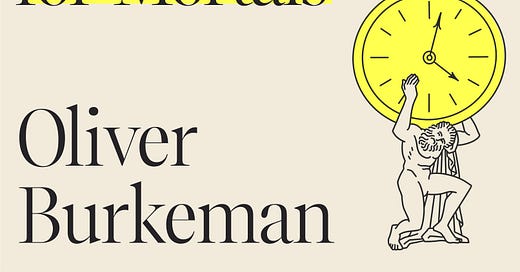#115: Four Thousand Weeks: Time Management for Mortals by Oliver Burkeman
Accept your limits.
Hello Readers,
This week I’m sharing some thoughts on Oliver Burkeman’s Four Thousand Weeks: Time Managment for Mortals and how it helped me accept my limitations as a reader and slow down to the speed art demands. Let’s get into it!1
I’ll start by saying I highly recommend this book. I have been mentioning it to everyone and wish I had read it years ago.
Burkeman was a productivity geek seeking the right set of tools to master his time. He sought peace in the knowledge that he was on top of everything, fulfilling every obligation, and didn’t need to worry about the future. He wanted to feel in control of his life.
One day he realized that the constant pursuit of efficiency and the perfect deployment of time management tools were giving him the opposite of peace — he was stressed and unhappy.
The solution, he found, was to stop avoiding the painful constraints of reality and embrace finitude. The inescapable truth is we mortals have limits. Our time is limited and we can’t do it all. Tough choices are required.
We embark on the futile attempt to “get everything done,” which is really another way of trying to evade responsibility of deciding what to do with our finite time - because if we actually could get everything done, we’d never have to choose among mutually exclusive possibilities.
Burkeman found peace in accepting his limits and stopped considering himself a failure for not living up to unrealistic productivity standards.
Embrace finitude
This has all kinds of implications, but one that stands out to me is how I’ve been avoiding my finitude when it comes to the media I consume. I make lists of things I want to read and watch and set goals in an effort to feel control over the uncontrollable.
The reality is I won’t get to it all. I’ll leave this world with books unread — the horror! By accepting those limitations, I can move on to the more important task of deciding what matters.
Slow down to the speed art demands
Burkeman says:
In a world geared for hurry, the capacity to resist the urge to hurry — to allow things to take the time they take — is a way to gain purchase on the world, to do the work that counts, and to derive satisfaction from the doing itself, instead of deferring all your fulfillment to the future.
Burkeman tells the story of Harvard professor Jennifer Roberts whose first assignment to all her students is to pick a painting or sculpture at the museum and look at it for 3 hours. She is attempting to influence the tempo at which her students work and help them “slow down to the speed art demands.”
This struck me as important for my reading life (and the way I consume art in general). If I’ve embraced finitude, made the tough choices, and decided what matters, then I don’t need to hurry through those choices. I can derive satisfaction from the doing and make the experience more meaningful.
Burkeman also says:
Stop badgering reality to hurry up. There are meaningful accomplishments that just take the time they take.
I hope you can find some insights for yourself in this book.
Thanks for reading!
Kyle
Some of you may be wondering “Kyle, when does the ‘year of fantasy’ start?” I promise I’m trying!





Loved this book. Life changing perception shift for me that I’m still trying to internalize.
This reminds me of the Canadian comedy The Red Green Show. When the actor who played Uncle Red did promotional spots for public television when it was broadcast in the U.S., he would appeal to potential viewers this way: “You’ve already wasted most of your life. What’s another half hour?”